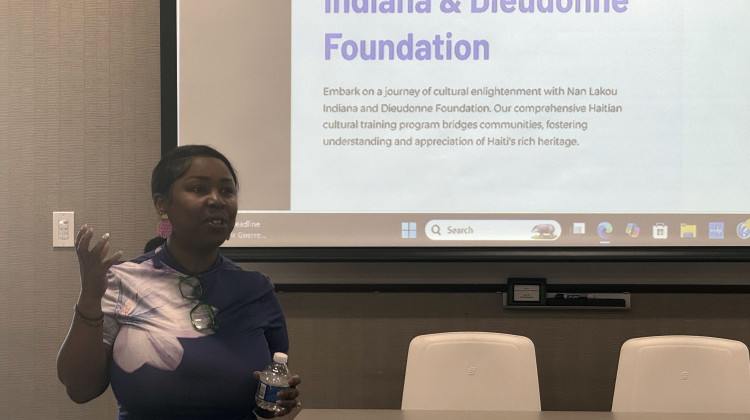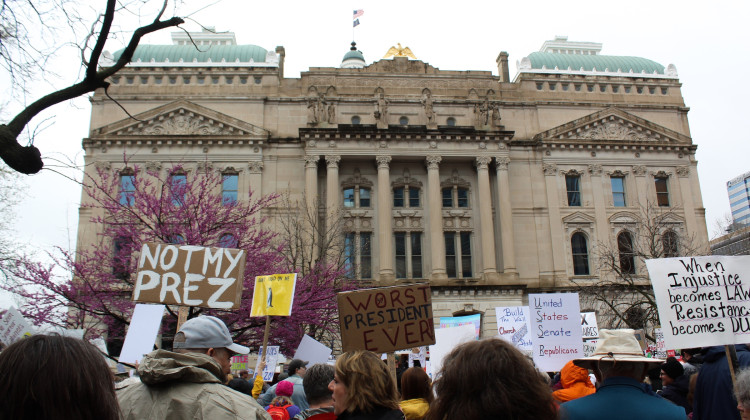
Voters wait in a line outside Broad Ripple High school to vote in the Indiana primary in Indianapolis, Tuesday, June 2, 2020 after coronavirus concerns prompted officials to delay the primary from its original May 5 date. Voters waited up to two hours to cast their ballots. Nearly 550,000 voters requested mail-in ballots, more than 10 times the number of those ballots cast during the 2016 primary.
AP Photo/Michael ConroyUpdated at June 2 at 7:15 p.m.
INDIANAPOLIS (AP) — Indiana’s first election to feature widespread mail-in balloting concluded Tuesday with long lines in Indianapolis delaying the closure of in-person voting locations.
Nearly 550,000 voters requested mail-in ballots — more than 10 times the number cast during the 2016 primary — after coronavirus concerns prompted officials to delay the primary by four weeks from its original May 5 date.
Republican President Donald Trump and Democratic challenger Joe Biden easily won Indiana's delegates in their respective primaries.
Voting Issues
Indianapolis voters faced waits of an hour or more at several voting locations throughout the day as Marion County had 22 sites open rather than its normal 270. Some candidates criticized county officials for that decision, but an election administrator said they had no other choice.
“It was impractical for us to have anything close to the normal number of locations during a pandemic,” said Russell Hollis, deputy director of the Marion County clerk’s office. It has been very difficult for us to recruit enough poll workers during the pandemic.”
Many of the Indianapolis polling locations were expected to remain open for at least an hour past the normal 6 p.m. closing time so voters in line could cast ballots, Hollis said. Several other counties also drastically slashed the number of polling sites open Tuesday. St. Joseph County, for instance, had 12 sites open in and around South Bend rather than the 120 planned before the pandemic struck.
The long lines at Indianapolis polling sites was the only significant issue reported statewide, Indiana Secretary of State’s office spokesman Ian Hauer said.
Some people questioned whether voters need to wear face masks inside polling sites. While state election officials encouraged voters to wear face masks, Hauer said they were not required to do so.
Some county election administrators and candidates have said they worried that thousands of mail-in ballots could go uncounted if they arrived at election offices after the noon Tuesday deadline. The huge increase in mail-in ballots also has election officials warning it could take more than one day to tally them all, possibly delaying determination of some primary winners.
Lake County Democratic Party chairman James Wieser said his county received more than 25,000 absentee ballots and that officials began counting them at 8 a.m. Tuesday. He was unsure when the count would be completed.
What's at Stake
In 2016, the Republican and Democratic presidential races weren’t settled ahead of Indiana’s primary. That drama — and voter draw — was missing this year with Biden and Trump cruising to victory.
Republican Gov. Eric Holcomb and Democratic business executive Woody Myers are unopposed for their party’s gubernatorial nominations for the November election.
5th Congressional District
The 15-candidate scrum for the Republican nomination to replace GOP Rep. Susan Brooks largely turned into a contest of Trump loyalty. The district has been a Republican bastion for decades, but Democrats are targeting it for the fall election as its suburban Indianapolis areas have become less solidly GOP.
Victoria Spartz has flooded TV screens and mailboxes with ads fueled largely by $900,000 she loaned to her campaign. That enabled Spartz to build name recognition as a first-time candidate after two years in the state Senate where she was picked by party activists to complete a retired senator’s term.
Spartz has also benefited from more than $400,000 in campaign spending by the Washington-based anti-tax Club for Growth, which paid for TV ads highlighting past criticisms of Trump by fellow candidates Carl Brizzi, a former Marion County prosecutor, and business owner Beth Henderson.
State Treasurer Kelly Mitchell, pediatric physician Chuck Dietzen and evangelical pastor Micah Beckwith are among the other candidates looking to emerge from the crowded GOP field.
Indiana Democrats, meanwhile, have largely backed former state Rep. Christina Hale, who was the 2016 Democratic lieutenant governor nominee, and she has already raised more than $1 million. Hale is being challenged by Dee Thornton, the party’s 2018 candidate for the seat, who has been endorsed by the Congressional Black Caucus PAC.
WATCH: Indiana 5fth District Town Hall - Republican Primary 2020
WATCH: Indiana 5th District Town Hall - Democratic Primary 2020
1st Congressional District
Rep. Pete Visclosky’s retirement after 36 years in Congress prompted several prominent Democrats to square off for the chance to replace him in the party’s northwestern Indiana stronghold.
Five-term Hammond Mayor Thomas McDermott likely started with an advantage from his high-profile position, but Visclosky endorsed Frank Mrvan, a Lake County township trustee whose father is a longtime state senator.
Lake County makes up about two-thirds of the district’s ballots, and those will likely also be split among state Rep. Mara Candelaria Reardon of Munster, Gary attorney Sabrina Haake and Melissa Borom of Gary, a former Visclosky aide who has been endorsed by several members of the Congressional Black Caucus. Valparaiso attorney Jim Harper, who was the 2018 Democratic candidate for secretary of state, is the best-known candidate from outside Lake County.
 DONATE
DONATE






 Support WFYI. We can't do it without you.
Support WFYI. We can't do it without you.